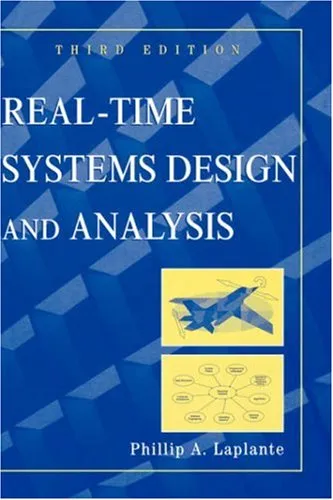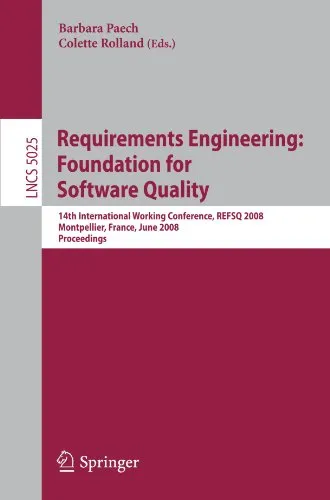Fundamentals of Software Engineering
4.0
بر اساس نظر کاربران

شما میتونید سوالاتتون در باره کتاب رو از هوش مصنوعیش بعد از ورود بپرسید
هر دانلود یا پرسش از هوش مصنوعی 2 امتیاز لازم دارد، برای بدست آوردن امتیاز رایگان، به صفحه ی راهنمای امتیازات سر بزنید و یک سری کار ارزشمند انجام بدینکتاب های مرتبط:
معرفی کتاب «Fundamentals of Software Engineering»
کتاب «Fundamentals of Software Engineering» نوشته کارلو گتزی، مهدی جزایری و دینو ماندریولی یکی از منابع برجسته و جامع در حوزه مهندسی نرمافزار است که به اصول پایه، روشها و شیوههای پیشرفته در این زمینه میپردازد. این کتاب برای دانشجویان، پژوهشگران و حرفهایهای دنیای فناوری اطلاعات یک راهنمای ارزشمند و کامل محسوب میشود.
خلاصهای از محتوای کتاب
کتاب با ارائه تعریفی جامع از مهندسی نرمافزار و هدف اصلی آن آغاز میشود. نویسندگان، در ابتدا به اصول اولیه مانند چرخه عمر نرمافزار (Software Development Life Cycle - SDLC) و روشهای توسعه نظیر Waterfall، Agile و مدل Spiral پرداخته و سپس به سراغ موضوعات پیشرفتهای همچون طراحی و معماری نرمافزار، تحلیل نیازمندیها، مدیریت پروژه و کیفیت نرمافزار میروند.
در بخشهای میانی، تاکید ویژهای بر Testing، Debugging و مستندسازی (Documentation) صورت گرفته است. همچنین، در فصلهای پایانی، نویسندگان موضوعاتی مانند نرمافزارهای توزیعشده (Distributed Systems) و استانداردهای بینالمللی را مطرح کرده و نگاهی عمیق به آینده مهندسی نرمافزار و نقش فناوریهای نوظهور میاندازند.
هدف اصلی این کتاب، انتقال دانش بهصورت ساختارمند، شفاف و تعاملی است تا دانشجویان و متخصصان بتوانند از آن برای حل چالشهای مرتبط با توسعه نرمافزار بهره ببرند.
نکات کلیدی و آموزهها
- درک کامل چرخه عمر نرمافزار (SDLC) و رابطه آن با موفقیت پروژههای نرمافزاری.
- مهارت در تحلیل نیازمندیها و مستندسازی صحیح برای تضمین تحقق نیازهای مشتری.
- آشنایی با تکنیکهای طراحی مانند Object-Oriented Design و مفاهیم معماری نرمافزار مانند MVC، Microservices و Layered Architecture.
- توانایی در بهکارگیری Testing Frameworkها و ابزارهای محبوب مانند JUnit، Selenium و موارد مشابه.
- بهکارگیری Agile Methodologies برای تسریع و بهینهسازی چرخه توسعه نرمافزار.
- شناخت روشهای مدیریت پروژههای نرمافزاری و استفاده از ابزارهایی نظیر Jira و Trello.
جملات معروف کتاب
"Software engineering is not just about building software, it's about building systems that reflect and support human needs."
چرا این کتاب اهمیت دارد؟
کتاب «Fundamentals of Software Engineering» تنها یک مرجع علمی نیست؛ بلکه راهنمایی کاربردی برای کسانی است که به دنبال توسعه محصولات نرمافزاری با کیفیت بالا هستند. اهمیت این اثر به دلیل تمرکز بر مفاهیم بنیادین و کاربردی، توجه به مسائل واقعی صنعت نرمافزار، و ارائه اطلاعاتی بهروز و عملی در دنیای فناوری است.
این کتاب به دلیل روش منسجم آموزشی خود، برای افرادی که تازه وارد دنیای مهندسی نرمافزار شدهاند و همچنین برای متخصصانی که به دنبال ارتقاء دانش خود هستند، ایدهآل است. علاوه بر این، نگارش آن توسط سه متخصص برجسته در این حوزه باعث میشود مفاهیم به شکلی علمی و دقیق ارائه شوند.
در نهایت، «Fundamentals of Software Engineering» ابزاری قدرتمند برای تبدیل دانش تئوریک به مهارتهای عملی برای تمامی متخصصان این حوزه است.
Introduction to "Fundamentals of Software Engineering"
Software engineering is a constantly evolving discipline that forms the backbone of modern computing and technological advancements. Recognized as a cornerstone for understanding the design, development, and maintenance of software systems, “Fundamentals of Software Engineering” offers a comprehensive approach to both foundational knowledge and real-world application. Authored by Carlo Ghezzi, Mehdi Jazayeri, and Dino Mandrioli, this book serves as a guiding principle for students, researchers, and professionals alike, focusing on the theoretical underpinnings and practicalities of producing high-quality software in a structured way.
In a world where software systems are becoming increasingly complex, the need for strong engineering principles is crucial. This book dives deep into the principles, practices, and processes that govern software projects, enabling readers to approach software development systematically and holistically. With its clear explanations, rigorous treatment of engineering concepts, and practical examples, “Fundamentals of Software Engineering” is both timeless and essential in its mission of instilling best practices in this dynamic field.
Let’s explore not just the summary of the book but its key takeaways, famous quotes, and why this book continues to matter for anyone aspiring to excel in the domain of software engineering.
Summary of the Book
At its core, “Fundamentals of Software Engineering” outlines a structured framework for understanding software development. The authors intertwine theory with real-world application, balancing the technology behind building software with the methodologies that make software reliable, maintainable, and scalable over time. The book explores the software lifecycle in depth, covering key aspects such as requirements analysis, design, implementation, testing, and maintenance.
The journey begins by laying down the principles of software development, emphasizing the importance of understanding problem domains and defining clear, actionable goals. As readers progress, they are introduced to critical concepts such as software architecture, design patterns, and reuse. Attention is also given to verification and validation techniques to ensure software reliability through effective testing methodologies. Moreover, the authors examine the challenges of managing projects, addressing elements like estimation, planning, and risk assessment.
This book stands apart due to its focus on formal methods. The authors advocate for mathematical rigor to specify and verify software correctness, ensuring a scientific approach to software engineering. By weaving together theoretical rigor with practical application, the authors help readers understand not just how to develop software but why each step matters in the broader context of engineering disciplines.
Key Takeaways
- A detailed exploration of the software development lifecycle, from requirements gathering to maintenance.
- An understanding of fundamental engineering principles applied to software development.
- The significance of formal methods and how they improve software correctness and reliability.
- Insights on design patterns, software reuse, and architectural considerations.
- Emphasis on verification, validation, and testing to reduce software defects.
- Management techniques for planning, risk assessment, and successful delivery of projects.
- A mix of theoretical rigor with practical case studies to ensure applicability across different scenarios.
Famous Quotes from the Book
“Programming is an individual activity; engineering is a team activity. Software engineering is about enabling collaboration while maintaining quality.”
“Processes may come and go, but the principles of software engineering remain constant.”
“Formal methods add discipline, clarity, and precision—hallmarks of an engineering approach to software development.”
Why This Book Matters
The role of software in society is ever-expanding, making the principles discussed in “Fundamentals of Software Engineering” more relevant than ever. As businesses and industries rely heavily on complex software systems, the margin for error has grown thinner, necessitating rigorous methodologies for software development. This book not only equips readers with the technical skills to address these challenges, but it also instills a deeper understanding of why engineering discipline matters in software projects.
For students pursuing software engineering, the text serves as a foundational guide, ensuring they appreciate both the academic and practical elements of the profession. For professionals, the book provides effective strategies to tackle everyday challenges, from managing teams to delivering scalable, high-performance applications. Additionally, researchers benefit from its thorough exploration of conceptual frameworks and the emphasis on formal methods to advance the field of software engineering.
In summary, “Fundamentals of Software Engineering” offers a timeless resource for mastering one of the most vital disciplines of the modern era. By combining academic exploration with practical relevance, it remains a trusted companion for those committed to excellence in software development.
دانلود رایگان مستقیم
شما میتونید سوالاتتون در باره کتاب رو از هوش مصنوعیش بعد از ورود بپرسید
دسترسی به کتابها از طریق پلتفرمهای قانونی و کتابخانههای عمومی نه تنها از حقوق نویسندگان و ناشران حمایت میکند، بلکه به پایداری فرهنگ کتابخوانی نیز کمک میرساند. پیش از دانلود، لحظهای به بررسی این گزینهها فکر کنید.
این کتاب رو در پلتفرم های دیگه ببینید
WorldCat به شما کمک میکنه تا کتاب ها رو در کتابخانه های سراسر دنیا پیدا کنید
امتیازها، نظرات تخصصی و صحبت ها درباره کتاب را در Goodreads ببینید
کتابهای کمیاب یا دست دوم را در AbeBooks پیدا کنید و بخرید
1458
بازدید4.0
امتیاز0
نظر98%
رضایتنظرات:
4.0
بر اساس 0 نظر کاربران
Questions & Answers
Ask questions about this book or help others by answering
No questions yet. Be the first to ask!















